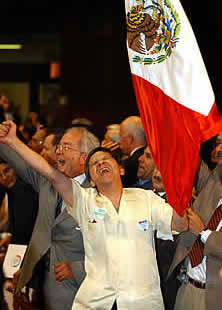 |
 |
 |
 News Around the Republic of Mexico | June 2005 News Around the Republic of Mexico | June 2005  
Mexico To Let Citizens Abroad Vote
 Lennox Samuels - The Dallas Morning News Lennox Samuels - The Dallas Morning News


| | A Mexican migrant reacts with joy on Tuesday after legislators approved a bill to allow Mexicans living abroad to vote in the 2006 presidential elections. (Photo: AP) |
Mexico City – The lower house of Congress on Tuesday overwhelmingly approved a law that allows millions of Mexicans living outside Mexico to vote by mail in the country's 2006 presidential election, a decision supporters hailed as historic.

The law could have a deep impact on the race for president, given the approximately 10 million Mexicans in the U.S. California and Texas have the greatest concentration of Mexicans.

There's little reliable information, however, about which candidate or party would most benefit in the election, scheduled for July 2, 2006.

"Everything we've done for the last 12 years suggests people abroad will vote in the same way their families do in the home country," said pollster Dan Lund of MUND Americas. "The fact that all three large parties got together on this suggests no party saw the other as having the advantage."

Meeting immediately after two committees approved the bill in joint session, the Chamber of Deputies adopted the measure, 455-6, with six abstentions. The bill previously was approved by the Senate and now goes to President Vicente Fox, who has said he will sign it.

"This is a first for Mexicans, a recognition that all Mexicans have the right to participate," Gonzalo Badillo, a member of a coalition supporting the measure, said after the vote. "This is a historic right."

During debate, however, several deputies expressed doubt about the law, some saying they were concerned about the possibility of fraud in a mail-in system.

"Today we have to accept and resign ourselves to this reform that leaves much to be desired," said Jesús González Schmal of the Convergence Party.

But Pablo Alejo López Núñez of Mr. Fox's National Action Party, or PAN, backed the bill as he urged colleagues to accept "this compromise that President Vicente Fox and the PAN proposed to reward the efforts and sacrifice of millions of Mexicans" who live abroad.

Luis Antonio Gónzalez Roldán of the Green Party urged that the government construct a reliable infrastructure to guarantee the postal vote.

Mexico's postal service, which has long been criticized for inefficiency, will be responsible for sending out ballots. Only those Mexicans living abroad who have credentials to vote in Mexico will be allowed to cast ballots next year.

Mexico has a population of 105 million. In addition to the 10 million Mexicans estimated to live in the U.S., both legally and illegally, perhaps 1 million more live in other countries.

The voting process will be overseen by the nation's Federal Election Institute, or IFE, which did not provide details Tuesday about how it will proceed.

Mexico's consul-general in Dallas said much depended on what system IFE would put in place.

"Obviously, I'm happy because it is a constitutional right and at the end all parties came to an agreement on this," said Consul-General Carlos García de Alba. "Now I'm trying to understand how they will proceed with this new kind of voting. The question is how IFE will apply the law and the amount of resources we are given."

He added that it was not clear whether the system would be administered by all 46 Mexican consulates in the U.S. or just the big ones in such states as California, Texas, New York and Illinois.

The lower house decision came within two days of the deadline by which a measure had to be adopted. For the voting system to be in place for the presidential election, it had to be adopted by June 30.

The likely candidates for president are Roberto Madrazo of the former ruling party, the Institutional Revolutionary Party, or PRI; Santiago Creel of the PAN; and Andrés Manuel López Obrador of the Party of the Democratic Revolution, or PRD.

David Miranda, national delegate for the PRD in the U.S., called the move positive but criticized the lawmakers' decision not to offer new voting cards to people in the U.S. and not to allow them to vote in ballot boxes.

Luis De la Garza, PRI director in Texas, also had mixed feelings.

"It's not what we wanted, but in the end we're starting with something," he said. | 
 | |
 |



